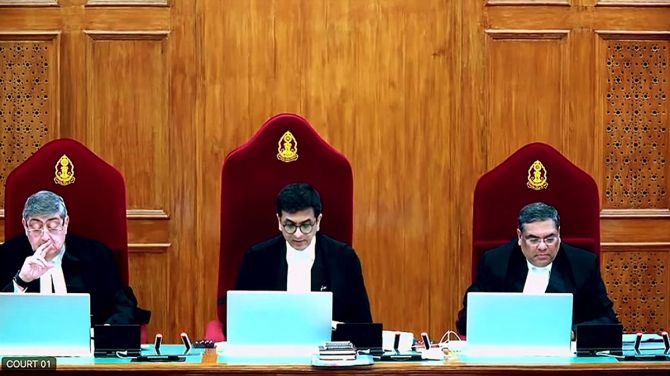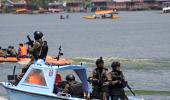'When the Exeutive can do whatever they want, why bother having an election?'

"People are quiet because they are terrified of being picked up and put in jail. In a rule of fear, people do not speak."
"My greatest fear is what will happen when that fear goes away and people are not fearful anymore," says Historian Radha Kumar, one of the three interlocutors on Jammu and Kashmir appointed by the then Union government in 2010.
Dr Kumar's expertise is in peace building, peacemaking and ethnic conflict, especially from a feminist perspective. She is the author of five books, the latest being Paradise at War, A Political History Of Kashmir.
She holds a PhD from Jawaharlal Nehru University, an MA and BA from Cambridge University, and was co-author of a report on human rights in Kashmir in 2020.
Dr Kumar discusses the Supreme Court verdict on Article 370 and what it means for Kashmir and the rest of India in a phone conversation with Rediff.com's Archana Masih.
Were you surprised by the Supreme Court verdict on Article 370 that upheld the government's removal of the special status to J&K?
I can't pretend to be surprised. I am still shocked. This suggests the Union government can do as it pleases to any state without consulting the people or their elected representatives.
It is a blow to democracy.
What is the way forward from here now that the final verdict on Article 370 has been pronounced and it is no longer binding?
5,500 people had to be jailed or in detention to pass the presidential orders [on August 5, 2019] and there is not one word about that in the judgment?
The justices said that the Centre's decision lacked 'mala fide intent'; if that was so, why were 5,500 jailed?
People have petitioned the same Supreme Court about the arrests that happened the evening before the orders were issued. Is there no connection between them?
Kashmiris have been totally alienated. They have been silenced and told that their voices don't matter in their own lives. They have no right to speak or to be consulted.
People are quiet because they are terrified of being picked up and put in jail. In a rule of fear, people do not speak. Do we want to be like China?
My greatest fear is what will happen when that fear goes away and people are not fearful anymore. The moment Kashmir is democratised, we may see a rise in militancy again.
This judgment has set us back almost to the 1980s which marked the beginning of insurgency in J&K. This is the ugliest situation in the state that I have seen in 70 years.
The presidential order of August 5, 2019 was the big reason for the alienation of Kashmir, less so for Jammu, but now both Jammu and Kargil are alienated.
The decision was left to the courts and after four long years, the Supreme Court says what the government did was right.
Therefore, there is no way forward. The way forward would have been to restore the confidence of the Kashmiris.
How is the government planning to do that? Are they going to undo this? Are they going to start a peace process asking them what they want?

The Supreme Court ruled the Article 370 was a temporary provision and the government was within its power to revoke it after 70 years. Most Opposition parties also supported it.
The judges said that Article 370 was temporary. It was temporary because when our Constitution was adopted, J&K didn't have a constituent assembly -- it was moving from a kingdom to democratic rule.
Article 370 had to be temporary till the J&K constituent assembly could ratify it and that happened in 1956.
The J&K constitution speaks about its relations with India which is clearly based on 370. But the court has not considered it relevant enough, even though that was the reason why it was temporary in the first place.
The 70 years argument is absurd. Our Constitution has existed for 73 years, should it also go?

One of the five judges recommended the setting up of a Truth and Reconciliation commission to investigate human rights violations in J&K.
The Truth and Reconciliation Commission came up after the end of apartheid in South Africa, but there has been no end to what is happening in Kashmir?
We have not come to an agreement with the Kashmiris, but have overturned whatever agreement there was.
Where is the chance of truth and reconciliation without a peace agreement?
The Supreme Court has asked the Election Commission to hold elections by September next year.
It will be more than ten years since the last election was held in J&K. I do not understand why the court did not say that elections should be held within a month.
The court hasn't even said that statehood should be restored before holding elections.
What makes me sad is that the courts are there to provide a check on the Executive and uphold the Constitution. But the verdict ducked every issue pertaining to the Constitution and democracy in India.
I have read all the parliamentary and legislative debates. I have read the Constituent Assembly debates five times and feel that the verdict is a betrayal of every single member of the Constituent Assembly of India.
Shyama Prasad Mukherjee (founder of the Bharatiya Jan Sangh, the Bharatiya Janata Party's parent) was a member of the Constituent Assembly and he accepted Article 370. He did not refuse it then. He only started his campaign after the Praja Parishad started its campaign in Jammu years later.
I had hoped the courts will stand up for democracy, but they haven't.

What do you see as the political future of J&K?
J&K is one indicator of India's political future. Bear in mind that these arbitrary arrests started in J&K and have spread to the rest of India.
Mahua Moitra didn't even have the right to defend herself!
The other concern expressed by some observers is that Parliament could legislate any Act on behalf of the state legislature through President's rule and damage federalism.
It affects our federal structure, democracy, right of freedom and expression, the right to consultation -- this judgment affects all of India.
When the Union and Executive can do whatever they want, why bother having an election?
How do you read the situation in Kashmir till the state elections if they were to happen in September?
Nothing happens quickly. There will be a sullen silence.
Anger and militancy simmers for a long time. Remember that full scale militancy broke out about 2-3 years after the 1987 rigged elections. It began with small incidents, but big attacks came two years later.

How do you view the security situation in J&K?
There will be perennial threats and challenges to security and J&K will require a very large security presence.
Kashmir will continue to be run as a security state, not a democratic one.
The cost and impact on our security forces will be severe. There is already a shortage of officers. Dealing with internal conflict is bad for the morale of any army.
The situation is going to be even more difficult than what it was in the early 1990s.
Feature Presentation: Aslam Hunani/Rediff.com










